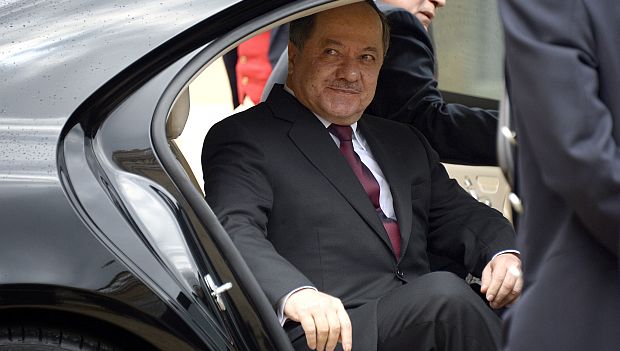
The president of Iraq’s autonomous Kurdish region, Massoud Barzani, leaves the Elysée Palace in Paris on May 23, 2014, after a meeting with the French President.
(AFP PHOTO/BERTRAND GUAY)
London, Asharq Al-Awsat—The president of Iraq’s Kurdistan Region, Massoud Barzani, threatened on Monday to hold a referendum on renegotiating the autonomous region’s relationship with Baghdad if incumbent Iraqi Prime Minister Nuri Al-Maliki wins a third term in office.
During a visit to Paris on Monday, Barzani said that Kurds would not join a government headed by Maliki, according to a statement issued by the Kurdistan Democratic Party (KDP).
“If Maliki secures a third term in office, our choice will be a public referendum in Kurdistan on a new formula for our relations with Baghdad,” Barzani is reported to have said during a meeting with Syrian opposition leader Ahmed Al-Jarba.
Barzani did not specify what the “new formula” for relations between Erbil and Baghdad would be.
The statement also quoted the KDP’s leader as saying that Kurdistan would work with the other political parties to find “a real partner” to head the next federal government of Iraq.
Barzani’s declaration came as negotiations continued on the formation of a new government for Iraq, with Maliki seeking to assemble a majority coalition and win a third term as prime minister.
Despite coming first in Iraq’s recent parliamentary election, Maliki’s State of Law coalition failed to achieve an outright victory, winning 92 out of 328 seats.
Maliki now faces the task of trying to win over many smaller forces and blocs in order to secure the majority he needs to form a government.
Speaking to Asharq Al-Awsat, one KDP lawmaker, Shawan Mohamed Taha, claimed Barzani’s stance represented the view of most of Iraq’s Kurdish parties, which he said had met recently and agreed “a united position and a unified Kurdish discourse and direction.”
Taha said: “This is what made Barzani cut all threads of hope that Maliki was clinging to. He [the prime minister] thought that all the things he is doing could eventually be a political bargaining chip.”
Taha added that Baghdad’s decision to stop paying the salaries and pensions of public sector employees and retirees in Kurdistan had made it more difficult to reach an understanding with Maliki.
“The Kurds have now come to the conclusion that there can be no reasoning with Maliki, who cut off the livelihood of the province’s employees in order to make the Kurds kneel down,” he said.
According to Taha, discussions between the Kurdish parties and other Iraqi political groups and blocs, including the Sadrist Al-Ahrar party, the Sunni Al-Muwatin and Mutahidoun, and the secular Al-Wataniyya, revolved around the idea that Maliki would not serve a third term as PM “under any circumstances.”
The three major parties in Iraqi Kurdistan, the KDP, the Patriotic Union of Kurdistan, and the Goran Movement, won 55 seats in the election. Smaller Islamist parties based in the autonomous region won 7.
Meanwhile, Maliki managed to court a number of smaller blocs in Iraq’s parliament, bringing the number of seats controlled by his allies to 112. However, he has so far been unable to attract allies away from the larger parliamentary blocs in his quest for the 165 seats he needs for a majority.
In the meantime, his major political rivals—the Kurdish Alliance, Mutahidoun, the Sadrist Movement, the Islamic Supreme Council of Iraq (ISCI), Al-Wataniyya and Al-Arabiyya—have taken steps towards forming a “grand coalition” capable of securing a parliamentary majority.
A statement by the Mutahidoun coalition said that its leader, parliamentary speaker Osama Al-Nujaifi, had met with Wataniyya leader Iyad Allawi and Saleh Al-Mutlaq, the leader of Al-Arabiya bloc, during which the results of the election were discussed, along with “the violations it involved.”
Mohamed Al-Khaledi, an MP for Mutahidoun, told Asharq Al-Awsat that Maliki’s rivals had “made important headway” in reaching an understanding, and that the two key members of the Shi’ite National Alliance—l;the ISCI and the Sadrist Movement—remained united in their rejection of a third term for Maliki.
“[We have the opportunity] to secure more than 200 MPs, which represents a sufficient majority and a lot more, to form the government quickly and without bargaining,” Khaledi said.
Meanwhile, a senior member of the ISCI, Baqir Al-Zubaidi, who is seen as one of Maliki’s chief rivals for the premiership, said he expected the coalition of smaller blocs Maliki is trying to assemble would eventually form the opposition to a government composed of Maliki’s rivals.

The leader of the Kurds threatening the Arabs with giving the Kurds what they have asked of their leaders for the past decade. Good one.
He has been saying this for a very long time now, do it already will you.